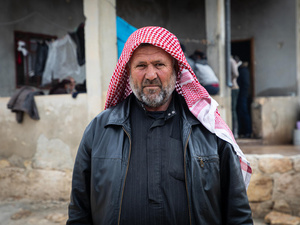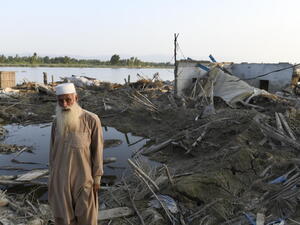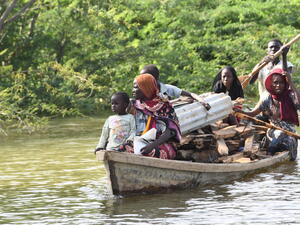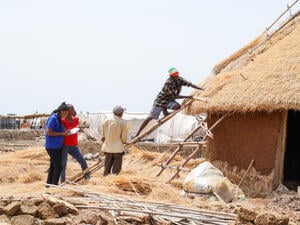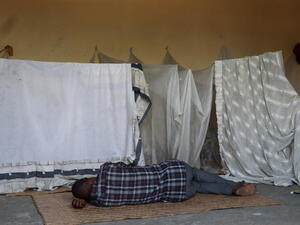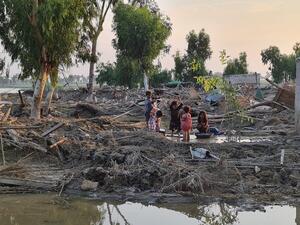UNHCR provides tents for hundreds of flood victims in Libya
UNHCR provides tents for hundreds of flood victims in Libya

Aid, including tents provided by UNHCR, was distributed to flood victims, such as this old man.
TRIPOLI, Libya, May 3 (UNHCR) - The UN refugee agency earlier this week donated 350 tents to provide shelter for hundreds of people forced to flee their homes in south-east Libya because of damaging floods.
Heavy rainstorms last week caused flooding, damaged homes and reportedly left at least five people dead and dozens injured in the deep south towns of Immralanib, Majdol, Tarpo, Zaolya and Hemerah.
At least 584 families (about 3,000 people) were forced to leave their homes, including 25 families who had previously been forcibly displaced from their homes by fighting in the Kufra region between government and rebel forces.
On Sunday, the Libyan Defence Ministry flew 350 family-size tents provided by UNHCR to the affected areas as well as blankets, mattresses, food and clothing provided by the Libyan Red Crescent and local NGOs, including LibAid and the Libyan Humanitarian Aid Mission based in the south.
A UNHCR protection official was on the flight, which was necessary because the roads to the affected area, some 900 kilometres south-east of Tripoli, were badly damaged by the floods. "Many houses collapsed, sometimes killing the people inside. The rain swept away whole houses," said Mohamed Akelah, a senior protection assistant with UNHCR. "Families are in desperate need of assistance."
The relief items were distributed in the affected towns on Sunday, Monday and Tuesday. But, as Akelah noted, the flood-affected are still at risk. They are exposed and vulnerable and in need of continuing help, including food and medicine. UNHCR is looking at ways to provide further assistance.
Also in Libya, UNHCR continues to provide protection and assistance to refugees and asylum-seekers, including Syrians and people from sub-Saharan Africa on mixed migration routes, as well as some 60,000 people still internally displaced almost two years after the end of the conflict that ended the Gaddafi regime.
The protection needs of the Syrians are a big concern, especially since the closure in February of the border with Egypt. As part of UNHCR's regular protection monitoring, the Tripoli office has received reports of arbitrary arrest, detention and mistreatment of Syrians trying to get into the country.
The refugee agency has to date registered some 8,100 Syrian refugees, but more than 100,000 more are believed to be in the country but not registered. Their presence is putting pressure on the education system and housing. UNHCR has started to increase its capacity to register the refugees, including the use of two mobile registration teams.
And UNHCR is providing assistance to the most vulnerable, including blankets, mattresses and kitchen and hygiene sets. The Ministry of Health recently granted Syrian refugees free access to medical centres and hospitals.
With regard to sub-Saharan Africans, who often face detention, UNHCR has worked with the authorities to help secure the release of the most vulnerable and to arrange for refugee ID to be given to hundreds of people of concern. UNHCR, in consultation with the Libyan authorities, is registering people deemed to be in need of international protection and issuing them with attestations to their status.
Meanwhile, the refugee agency has recently noted an increase in the number of people leaving Libya by sea in hopes of reaching Europe. Since the start of March, 24 boats have departed from Libya carrying about 2,500 people, including 1,790 in April. Those on board were mainly from Eritrea, Ethiopia, Somalia and Sudan. Nineteen reached Italy, one made it to Malta and four were turned back by the Libyan coastguard.

